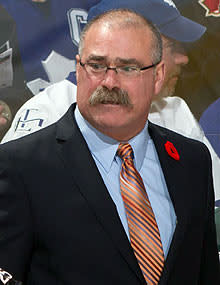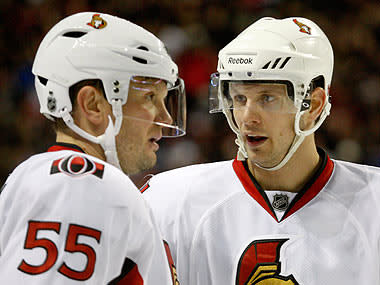Surprising Senators just wanted to be heard
Listen to this: The Ottawa Senators, perhaps the odds-on favorites to be the worst team in the NHL entering the season, are in a playoff position in the Eastern Conference. They won six straight games before their streak was snapped this week. They have the league's top power play.
Why?
It's all about the ears. It starts with coach Paul MacLean, who left an assistant job with the veteran-laden, long-successful Detroit Red Wings to take the head job with the youth-oriented, new-look Senators. A move like that has obvious challenges. But it has some benefits, too.
"They listen better," said MacLean's old boss, Wings coach Mike Babcock, with a sly smile.
A group of reporters chuckled at that, but Babcock was serious. Young players aren't in a position to evaluate the coach, because they're more worried about being evaluated by him.
"They haven't been around 700 years," said Babcock, who has coached at several different levels. "It's like coaching junior and college. They do what you tell 'em. They have to. As you coach a more experienced group, they have more input. That's the facts. Now, that makes them fun to coach, too. But at times, it makes them harder to coach."
Thing is, MacLean has given his experienced players some input as well. And he has done what they tell him when appropriate.
There was a lack of communication under former coach Cory Clouston, whose final season was a disaster. There was a fire sale before the trade deadline that included the departures of veterans Mike Fisher(notes), Chris Kelly(notes), Alexei Kovalev, Jarkko Ruutu(notes), Chris Campoli(notes) and Brian Elliott(notes). Only a late rally kept the Sens out of the basement in the East, and they escaped it by only two points.
The toxic cloud has cleared under MacLean, a longtime NHL player and coach with a bushy mustache, sense of humor and approachable personality.
One of the first things MacLean did after landing the Sens job was call veteran center Jason Spezza(notes). He asked him about the team. He made him feel important. He told him he was counting on him to set an example for the youngsters. Spezza is off to a strong start with 15 points, tied for fifth in the league in scoring.
As he set up the power play, MacLean asked veteran defenseman Sergei Gonchar(notes) where he felt most comfortable. Right point or left? He asked him how he thought it should run. The Senators signed Gonchar to a three-year, $16.5 million contract last summer mainly to bolster their power play, and he struggled badly last season. He's off to a decent start this season with nine assists.
MacLean also has leaned on captain Daniel Alfredsson(notes), of course. When the Senators visited Detroit for their season opener Oct. 7, Wings defenseman Niklas Kronwall(notes) talked to some Ottawa counterparts, fellow Swedes. He said they seemed "very happy."
"What they talked about was, they weren't used to a coach that listened to them in the way that (MacLean) does, just the way he does it, and they can talk about things," Kronwall said. "They were very pleased so far."
This is what Sens general manager Bryan Murray had in mind when he hired MacLean.
"He is a former player who has been around all kinds of ages," Murray said. "I don't think it matters if you're necessarily coaching veterans or younger players, but I think he's got teaching skills. He's a communicator. People like that usually give good information to young people, and there's a tolerance level, too, because he's been around veteran players and understands when you bring a young guy in there's some mistakes occasionally."
Early in training camp, MacLean showed his Senators how he wanted them to play. He used video examples from the playoffs, from some of the best teams in the league – Wings clips, San Jose Sharks clips, Vancouver Canucks clips, Boston Bruins clips. He skated the boys hard and drilled them on their puck skills, hockey-school style.
They needed it. They lost to the Toronto Maple Leafs in the exhibition opener, 4-2. It looked like it was going to be a long season of rebuilding.
"Is it different [from Detroit]?" MacLean said in a quiet moment after that game. "Yes, it's different. But it's also a great opportunity, and it's exciting. These young guys want to learn. … For me, I think you've got to be able to play with speed and play 200 feet. You want to make sure that you're attacking the net and you play defense first."
The Sens started slowly, 1-5-0. They lost a couple of those games spectacularly – 7-1 to the Colorado Avalanche, 7-2 to the Philadelphia Flyers, both at home. Defense first? Yikes.
MacLean kept skating them. Then came a 4-1 victory over the Winnipeg Jets, and a 4-3 victory over the Columbus Blue Jackets, and a 3-2 victory over the Carolina Hurricanes, and … Six consecutive victories before a sloppy 5-3 loss Tuesday night to the Bruins, the slumping Stanley Cup champions, who were desperate to snap out of a funk at home.
"It's not like things went great for him right off the hop," Babcock said. "But he just stuck with it and knew what he was doing and has been around, winning a long time, and steady on the rudder and here they go."
Where will they go from here? Let's not get carried away. People didn't have low expectations of the Senators entering the season; they had no expectations of them. Even a six-game winning streak shouldn't change much.
This is a topsy-turvy, upside-down league in which the Leafs are first in the East and the Edmonton Oilers first in the West, while the Bruins are last in the East and the Wings third-worst in the West. Anything can happen, yes. But it's early, and you've got to think things will balance out a bit.
The Senators still have plenty to work on. While their power play ranks first (28.9 percent), their penalty kill ranks 27th (73.4) – not good when you're third-worst in penalties per game (17.2). While they're fifth in goals per game (3.00) after finishing 29th last season (2.32), they're dead last in goals against (3.85). Some of the stats are skewed by those blowout losses. Still, this is not a juggernaut and should not be judged like one.
"No. 1, you have to compete," Murray said. "You have to work hard every night. You have to stay in games. But the telltale sign obviously is, do you improve? Do individuals improve, and does the team play improve? And I believe that's the gauge that I'll have and I'm sure Paul will as well."
But there has been improvement already, and it looks like there is room for more.
Left winger Milan Michalek(notes) is healthy and productive with 13 points. Erik Karlsson(notes), the 21-year-old budding star on the back end, also has 13 points, tied for first among defensemen. He leads the entire league with 12 assists.
Two rookies to note: left winger Colin Greening(notes), who has four goals and eight points, and defenseman David Rundblad(notes), who set up one of Greening's goals with a gorgeous stretch pass Sunday night against Toronto.
Goaltender Craig Anderson's(notes) stats look ugly – 3.80 goals-against average, .880 save percentage – but again, the blowout losses skewed them a bit. He's 6-3-0 and still the guy that carried Colorado to the playoffs in 2009-10 the season after the Avs finished last in the West.
The Sens have surprised even though Alfredsson, a 38-year-old coming off back surgery, has missed three games (and counting) because of a hip injury and a concussion. The flyer the Sens have taken on Nikita Filatov(notes) hasn't panned out, either, at least not yet.
Bare minimum, under MacLean the Sens shouldn't be as bad as we thought. Maybe they never were.
"When [a coach goes] to a place and suddenly they're way better than you thought," Babcock said, "maybe they weren't playing as good as they should have been playing."



